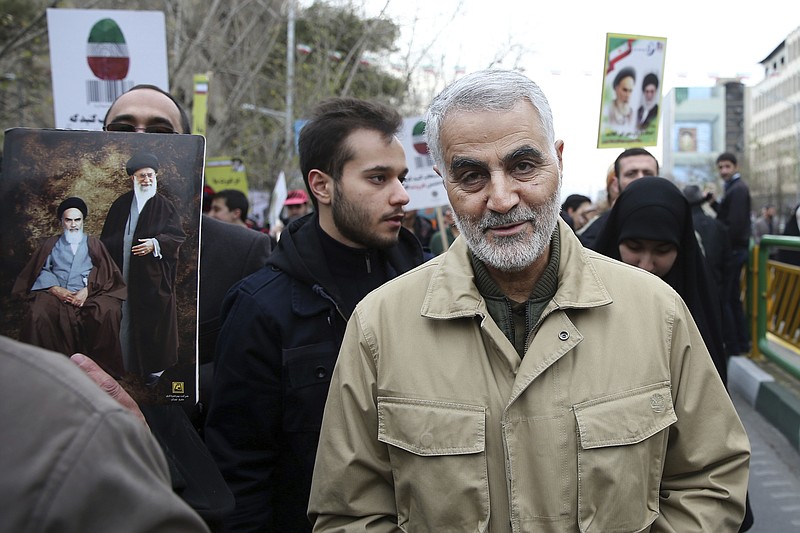With the U.S. killing of the man who headed Iran's Islamic Revolutionary Guard Corps' elite Quds Force and was its top security and intelligence commander, the usual suspects hurried to their corners Friday.
Trump administration members and Republicans universally praised the removal of Gen. Qassem Soleimani, who is said to have been responsible for the death of many thousands of innocent people, while Democrats and their national media cohorts rained scorn on President Donald Trump for potentially escalating tensions in the Middle East.
It was the partisan response the country has come to expect these days, rather than the former bipartisanship of speaking in one voice on serious military matters.
The action, no matter what one thinks of it, is likely to bring about a significant response from Iran and could set off a deadly game of cat and mouse between the world's leading terror sponsor and the Western power Iran refers to as the Great Satan.
(More: Iran vows 'harsh' response to US killing of top general; Tennessee local lawmakers react)
We hope it won't.
The Pentagon, for its part, made it known Trump ordered the MQ-9 Reaper drone strike on Soleimani at the Baghdad, Iraq, International Airport, and Democrats immediately pounced while acknowledging the Iran strongman was no prince. Abu Mahdi al-Muhandis, the deputy head of the Iran-backed Popular Mobilization Forces, and at least four others also were killed in the attack on a convoy of vehicles leaving the airport.
Secretary of State Mike Pompeo, meanwhile, said the action was taken to neutralize future attacks the general was planning on U.S. and other interests.
Trump on Friday tweeted that Soleimani "has killed or badly wounded thousands of Americans over an extended period of time, and was plotting to kill many more ... but got caught!"
He also said the general was directly or indirectly responsible for the death of millions, including protesters recently killed in Iran, and was culpable in the recent U.S. embassy attack in Baghdad.
Sen. Lindsay Graham, R-South Carolina, called Soleimani the "right fist" of Iran's Supreme Ayatollah Ali Khamenei and concluded the U.S. just "took the ayatollah's arm off."
Although experts said there is no one of the general's equal in Iran, where he is considered a national hero, don't look for the country to stop sponsoring terror because of a power vacuum. Someone already has been put in his place, according to a statement published by the country's official news agency, and the sponsored violence will go on.
(More: Southern, local lawmakers divided over U.S. strike that killed Iranian leader)
In the interim, the U.S. must worry about the blowback. Will a response come directly against the U.S., against U.S. bases or soldiers in the region, or against U.S. allies like Iraq or Israel. And when that response or those responses occur, what will the U.S. do?
Neither the U.S. nor Iran should want war. The U.S. already spent eight years at war in Iraq, where Soleimani is credited for backing Shia militias against Americans and flooding the country with roadside bombs Iran manufactured. And it is still slogging through a now nearly 19-year-old war with Afghanistan. Iran, meanwhile, is fraught with political instability and economic tension.
Trump has repeatedly said he doesn't like "endless wars," so we hope he'll keep that in mind with this situation.
Although the military situations are different, we couldn't help compare the Soleimani attack with Operation Desert Fox, a four-day bombing campaign in Iraq that occurred at the same the U.S. House of Representatives was conducting an impeachment hearing against President Bill Clinton in 1998. Four months earlier, three days after Clinton admitted to having an inappropriate relationship with the White House intern, he authorized missile strikes in an effort called Operation Infinite Reach against terrorist bases in Sudan and Afghanistan.
Clinton foes at the time said the strikes were just a distraction. Trump, of course, was impeached by the U.S. House last month and is awaiting a trial in the Senate.
(More: Pentagon says US airstrike killed powerful Iranian general)
The recent escalation of hostilities began with a rocket attack at an Iraqi military base in December that killed an American military contractor. The U.S. responded with airstrikes on an Iranian-backed militia in Iraq that killed 24. That prompted protests at the U.S. Embassy in Baghdad earlier this week and a fire set in the embassy's reception area by Iranian militiamen. In turn, several hundred additional U.S. troops were deployed to the region.
Pompeo, since the attack on Soleimani, has emphasized a commitment to de-escalation of the situation to U.S. foreign allies and stressed the defensive nature of the killings.
As we await what, if any, retaliatory steps Iran will take, we hope the secretary of state is right. The U.S. must stand up to terrorist actions and threats, but we shouldn't widen the confrontation beyond its current parameters.
